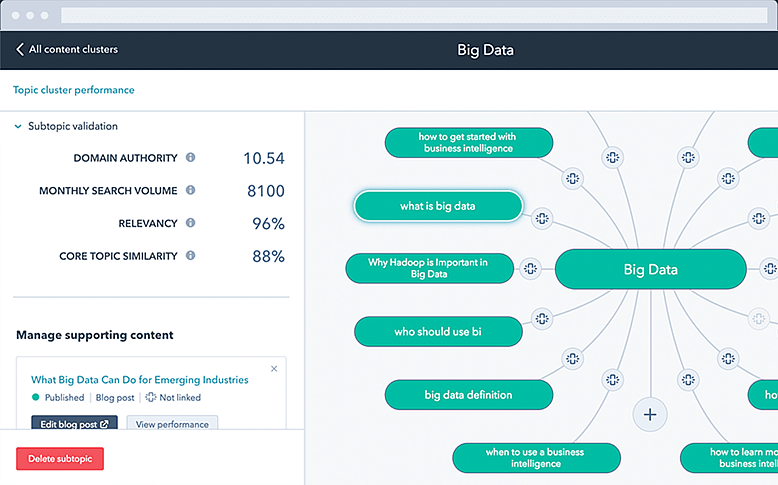Establishing relevance to boost your SEO.
27.02.2020
What is topical relevance & why is it important?
Establishing topical relevance is one of the most important steps in creating a successful SEO strategy. Topical relevance has become increasingly important in recent years. This stems from the change in the way people use search engines to find answers to their queries. People have become far more trusting of search engines like Google when searching for information, therefore, their queries have become more complex.

10 years ago, users would enter queries based on keywords, like “long-distance running shoes”. Now, users are comfortable in searching for “what are the best shoes for long-distance running with arch support?”. When users’ queries evolved in complexity, so did search engine algorithms. They’ve long moved past keyword-based information retrieval and now use machine learning-led technologies to understand the relationship between words and phrases to pull up the most relevant information. They understand the topical context behind the text and can link it to similar searches they have encountered in the past to bring back relevant results.
Building topical relevance means creating content across topics, not just keywords. Therefore, the way companies approach SEO has changed, but many organisations we speak to still focus on keywords rather than building topic relevance.
Keywords are single words or a key phrase that someone uses to describe what they need from a search.
Topics are groups of keywords someone uses in an online search, and what you should build your content strategy around.
How do you establish topical relevance?
You can build SEO topical relevance by following our simple three-step plan.
- Work out which topics you want to be known for
- Publish lots of blog content that answer every question about those topics
- Link the blog posts to one another
1. Figure out which topics you want to be known for.
The topics that you choose will form the foundation of your content strategy and inform your wider marketing strategy. Your topics should be directly related to what your business does and what you want to be known for. What do you want to appear in search results for when someone enters a related query? If you are an immigration Law firm you would choose topics such as Personal Immigration, Business Immigration and Employer Sponsorship, for example. Essentially, your topics are centred around the services you provide.
To come up with ideas write a list of the core services you provide. Try to keep it at around 3-5 core topics, to begin with. Then, under each topic, write down all of the possible queries someone might enter into Google when looking for your services. To help, use or create buyer personas. Collect FAQs from your sales team, think about the shared challenges your customers face, and use SEO tools like Ubersuggest, SEMrush and Moz to find out what’s being frequently searched for.
2. Publish lots of related blog content.
Once you have identified your core topics and you know what questions are being asked by your target audience, it is time to start creating content to satisfy their needs and build search relevance.
The ‘sub-topic’ content you create helps you to rank for the overarching core topic.
We use Hubspot’s SEO planning tool to help you build out a search engine optimised content strategy based around topics (see below).
By publishing high-quality educational content linked to your core topic and improving your search authority in tandem, you will rise up the search rankings.

3. Hyperlink your sub-topic blogs to one another.
When you have enough original content around a certain topic, you should revisit each post and make sure there is at least one hyperlink to another sub-topic blog post relating to the same topic.
Linking related posts to each other will help Google’s bots to understand the content and the underlying relationship, demonstrating your content’s topical relevance. It also helps boost your authority on the topic and rank higher in search engines for related search queries.

When do pillar pages come into play?
As we discussed in our post on pillar pages, pillar pages cover all content relating to a topic on one page. They contain detailed topic cluster content; blog posts, webinars, white papers, podcasts, videos etc to help search engines discover your content and rank its relevance and authority.
Once you have collated enough original content around one core topic, you can build your pillar page to house all the content around a topic. This page will have lots of SEO juice and will be favoured by search engines, ranking highly and demonstrating your relevance and authority on a topic.
The next step: building authority
Other than building topical relevance, building authority is the most important aspect of a successful SEO strategy.
To learn more about building search authority read our blog post on how to build SEO topical authority.

